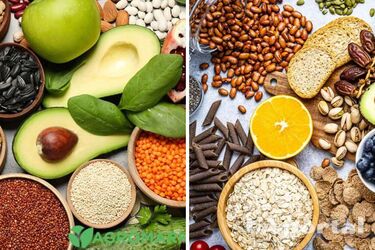To stabilize blood sugar: nutritionists named foods high in fiber

High cholesterol, overweight, diabetes, and gastrointestinal problems are common problems faced by people around the world. Luckily, there is an easy and affordable way to improve your health – eat high-fiber foods.
Eating high-fiber foods is a simple and effective way to improve your health. Increase your fiber intake today and feel the difference. This was reported by dailynews.kyiv.ua.
What is fiber?
Fiber, or dietary fiber, is a complex carbohydrate that is not absorbed by the body. However, they play an important role in digestion and overall health.
The benefits of fiber:
- Improves digestion: Fiber stimulates the intestines, helping food pass more easily through the digestive tract.
- Lowers cholesterol levels: Soluble fiber binds to cholesterol in the intestines and removes it from the body.
- Helps to lose weight: Fiber makes you feel full, which can help reduce the number of calories you consume.
- Stabilizes blood sugar levels: Insoluble fiber slows the absorption of sugar into the bloodstream, which is beneficial for people with diabetes.
- Reduces the risk of certain types of cancer: Eating foods high in fiber can help reduce the risk of colon cancer and other cancers.
Where is fiber found?
There are many foods rich in fiber. Here are some of them:
- Fruits: apples, pears, bananas, berries
- Vegetables: broccoli, Brussels sprouts, carrots, beets
- Legumes: beans, lentils, peas
- Whole grain products: oatmeal, brown rice, whole grain bread
- Nuts and seeds: almonds, walnuts, flax, chia seeds
- Dark chocolate: chocolate with a high cocoa content (70% or more)
Recommendations for fiber intake:
- Women: 24 grams of fiber per day
- Men: 38 grams of fiber per day
- Increase your fiber intake gradually: a sudden increase can lead to bloating and other digestive problems.
- Drink plenty of water: this will help the fiber swell in the intestines and pass through them more easily.
- Choose whole grains over refined foods: whole grains contain more fiber, vitamins, and minerals.
- Eat fruits and vegetables with the skin on: the skin contains most of the fiber.
- Add legumes and nuts to your diet: they are great sources of fiber, protein, and other nutrients.
Attention: This content is for informational purposes only and does not contain any medical advice. For medication, diagnosis, and other medical advice, please consult your doctor.
If you want to get the latest news about the war and events in Ukraine, subscribe to our Telegram channel!
